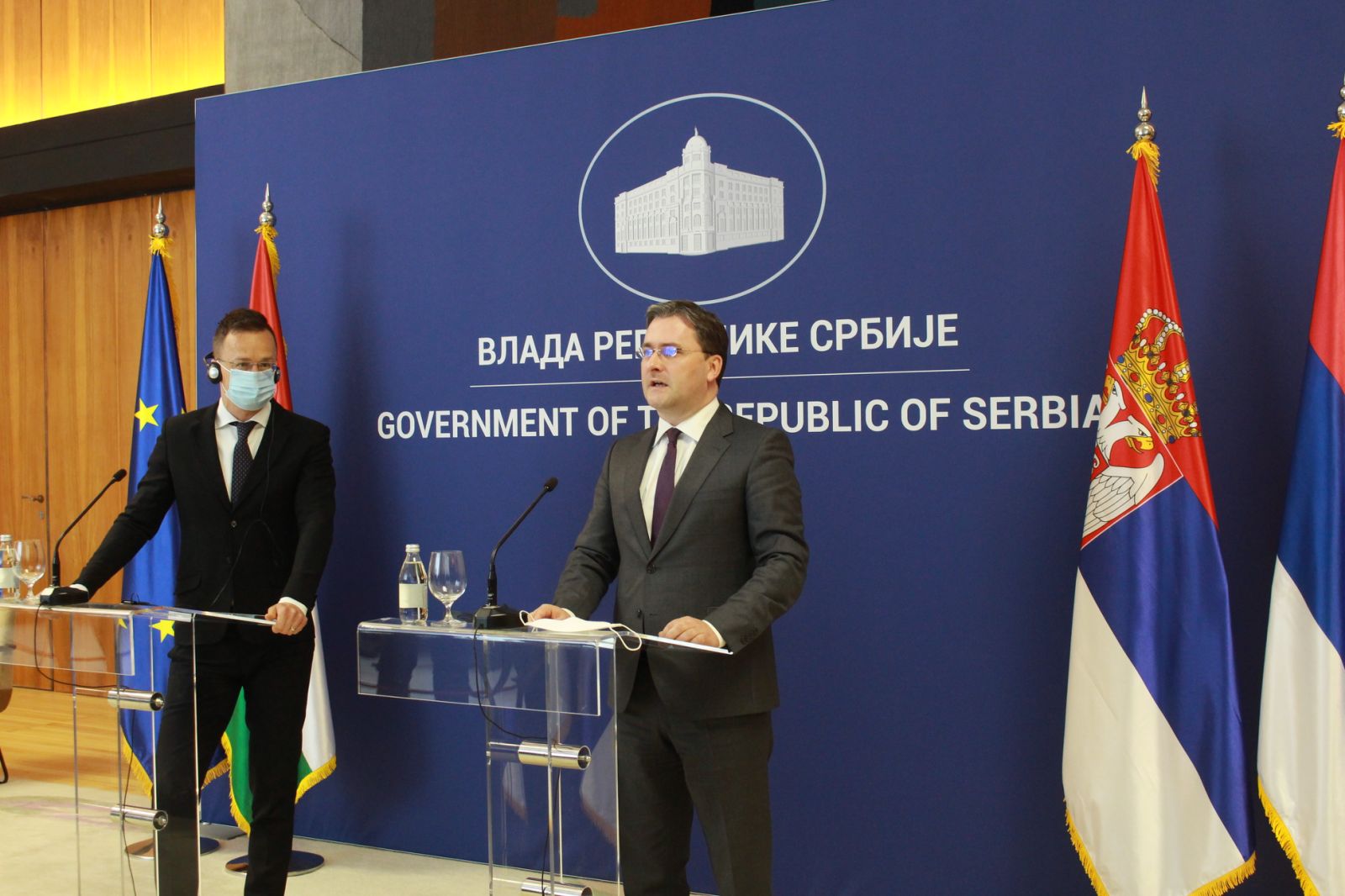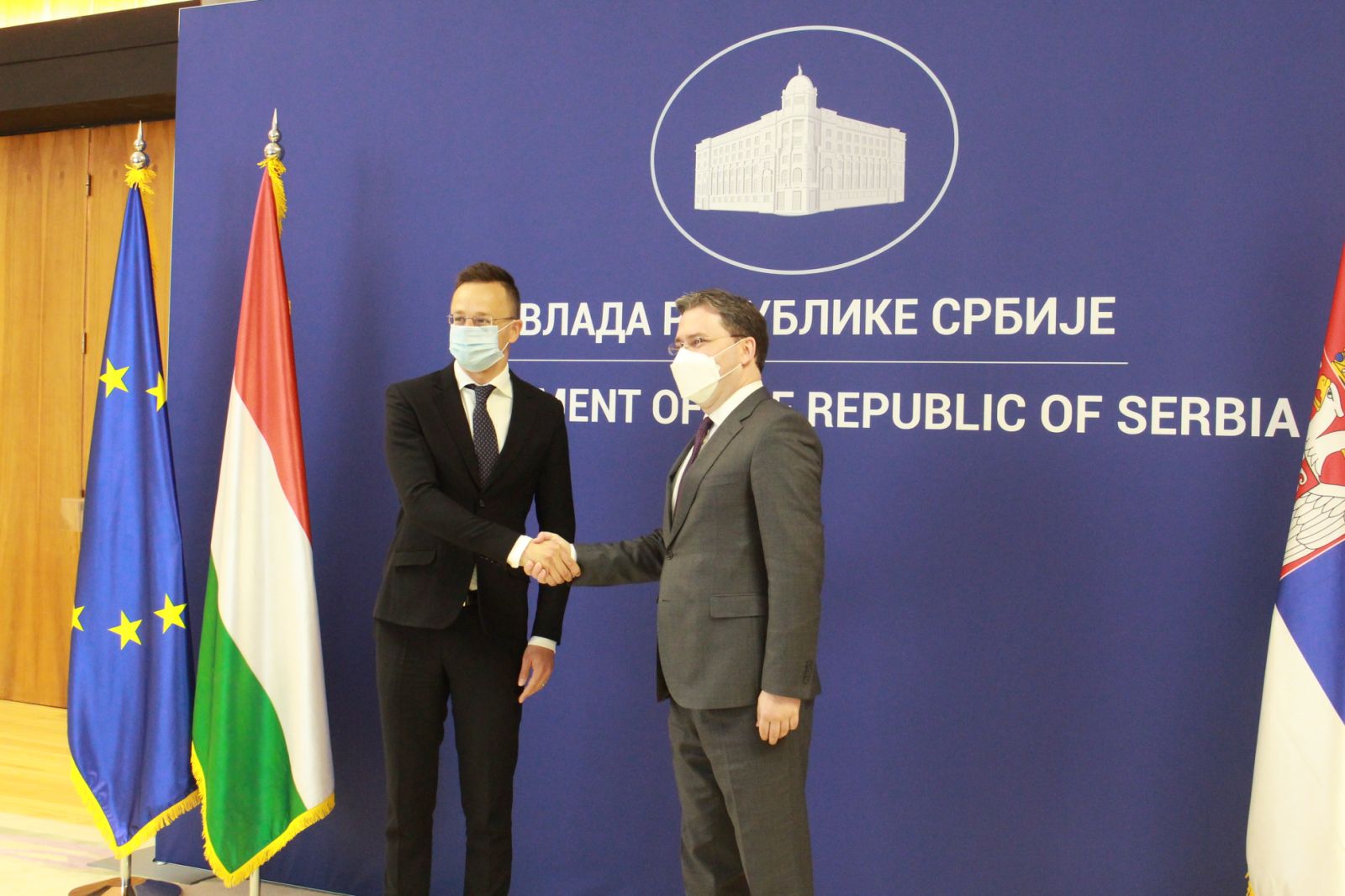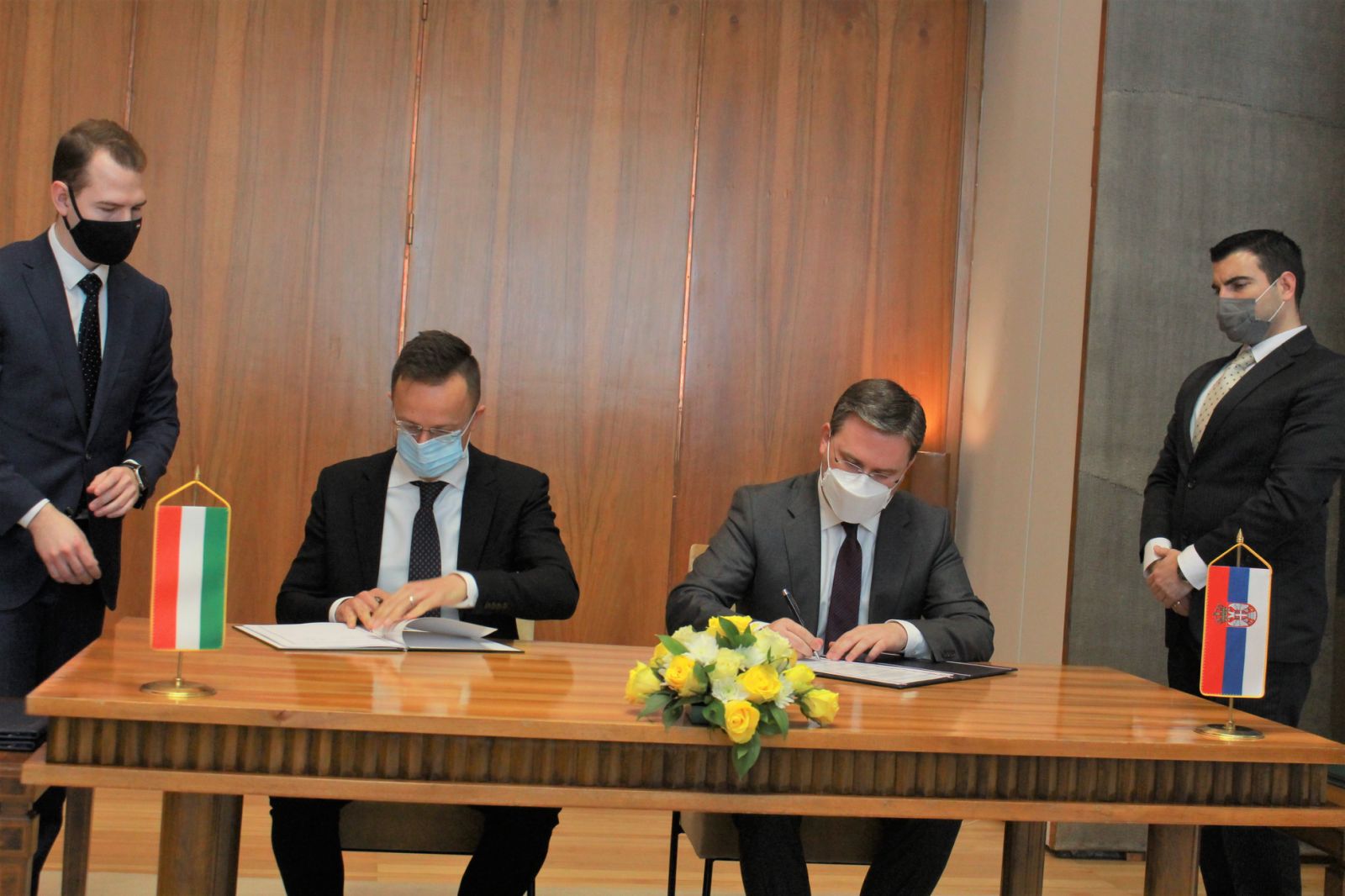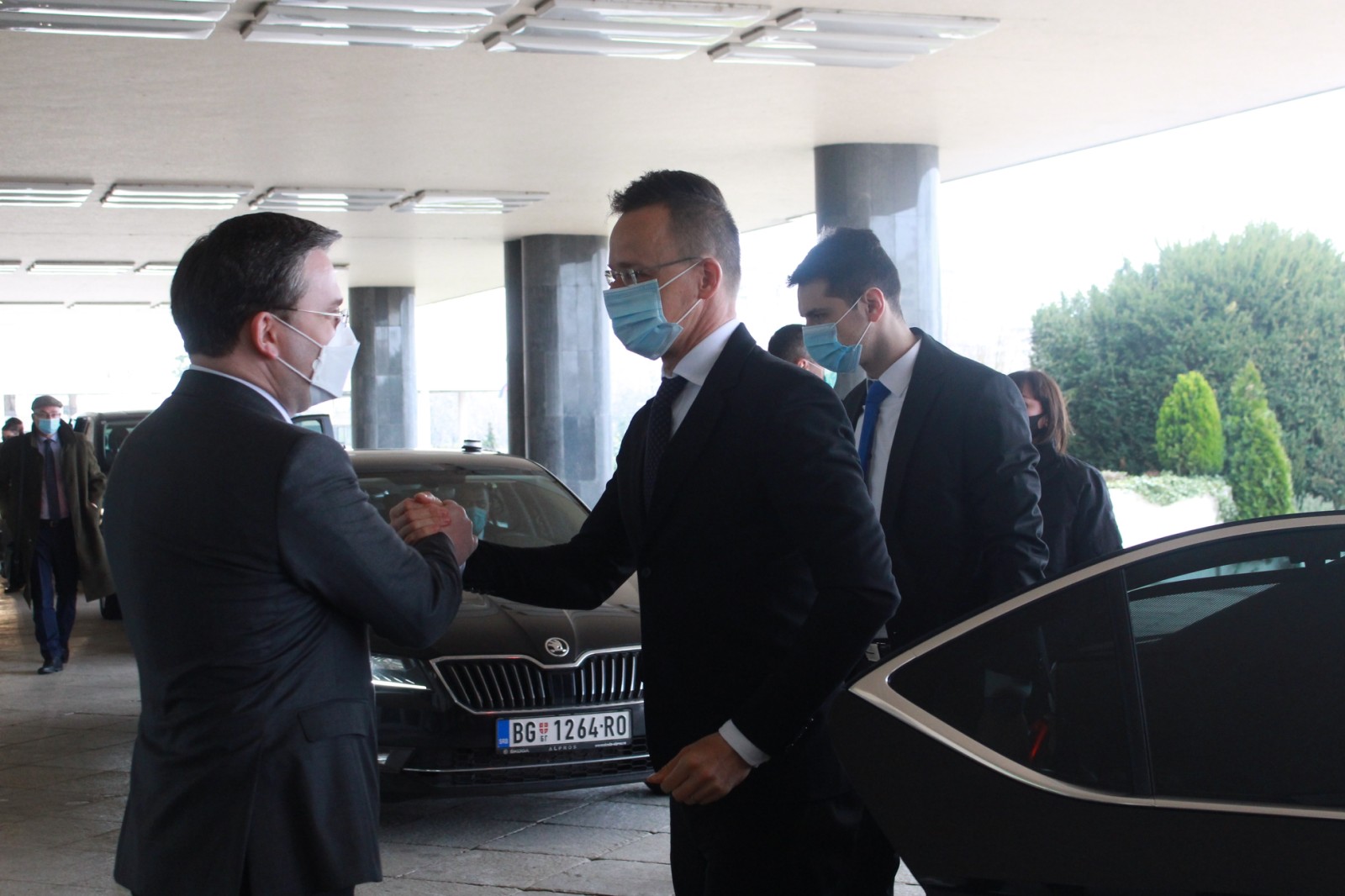 After the meeting with his Hungarian counterpart Péter Szijjártó, Minister of Foreign Affairs Nikola Selakovic pointed out that the relations between Serbia and Hungary were at the historically highest possible level which was the result of increasingly frequent activities between officials of the two countries and good relations between President Aleksandar Vucic and Prime Minister Viktor Orbán.
After the meeting with his Hungarian counterpart Péter Szijjártó, Minister of Foreign Affairs Nikola Selakovic pointed out that the relations between Serbia and Hungary were at the historically highest possible level which was the result of increasingly frequent activities between officials of the two countries and good relations between President Aleksandar Vucic and Prime Minister Viktor Orbán.
Selakovic and Szijjártó today signed Protocol on co-location, and the Head of Serbian diplomacy stated that they signed three very important protocols to the Memorandum on co-location.
Communication was established on a quarterly basis, and the Memorandum stipulates that Serbia and Hungary jointly use premises, namely that in countries where one of the two states does not have a diplomatic/consular mission of its own uses the premises of the Embassy of the other state.
Selakovic said that today they specifically signed that Hungarians can use our embassy in Lusaka, and that Serbian diplomats can use Hungarian embassies in Malta, but also in Santiago (Chile).
 "It is important that the relations between the two countries are truly friendly, and these three protocols we signed today are in fact a strategic partnership before the strategic partnership agreement, because when you share your embassy and your consulate with someone, then this is someone you trust absolutely. A firm trust between friends and good neighbours has been built between Hungary and Serbia as two, I can freely say, more and more fraternal peoples", the Serbian Foreign Minister said.
"It is important that the relations between the two countries are truly friendly, and these three protocols we signed today are in fact a strategic partnership before the strategic partnership agreement, because when you share your embassy and your consulate with someone, then this is someone you trust absolutely. A firm trust between friends and good neighbours has been built between Hungary and Serbia as two, I can freely say, more and more fraternal peoples", the Serbian Foreign Minister said.
Emphasizing that Serbia and Hungary were fighting the Covid-19 pandemic together, Selakovic congratulated Hungary on the remarkable success it achieved in combating Covid-19 lately and thanked Hungary for its selfless assistance to Serbia in the form of medical equipment and ventilators for the Clinical Center of Vojvodina in Senta, but also for the aid that Hungary provided to Banja Luka.
Selakovic pointed out that the economic cooperation with Hungary was at an exceptional level, and in this context he noted that the trade in goods between the two countries last year - in the year of Covid - recorded a growth and amounted to EUR 1.940 billion.
He said that Hungary became the third trade partner of Serbia among the EU countries, adding that there was a growing interest of Hungarian investors for Serbia.
The Minister thanked Hungary for its support to Serbia in European integration and stated that this country supported the opening of all chapters for which Serbia had prepared a negotiating position, a total of even more than five at the moment, not only chapters 2, 3, 14, 21 and 27, but also chapters 10 and 22.
 When it comes to cooperation between the two countries on the issue of treatment of national minorities, Selakovic said that the Hungarian authorities took particular care of the Serbian national minority as well as the representatives of the Serbian Orthodox Church.
When it comes to cooperation between the two countries on the issue of treatment of national minorities, Selakovic said that the Hungarian authorities took particular care of the Serbian national minority as well as the representatives of the Serbian Orthodox Church.
"It is extremely important for us that Hungary takes over Chairmanship of the Committee of Ministers of the Council of Europe in May. This is very important for us, having in mind the indications that Pristina is applying for membership in the Council of Europe", Selakovic said.
The Serbian Foreign Minister underlined that the joint implementation of projects would continue in the fields infrastructure, transport and economy.
He said that the first part of the Belgrade - Budapest railway was being built at a fast pace, that the first section from Belgrade to Novi Sad would be completed next year, continuing the construction towards Subotica, but also that a public call was expected to be issued on 29 March for the reconstruction of the Subotica - Szeged - Baja railway line.
Selakovic also stated that he expected that, depending on the epidemiological situation, the sixth Joint Session of the two Governments would be held, and that an agreement on strategic friendship between the two countries would be on the agenda.
Szijjártó: We have shown the meaning of good-neighbourly relations
At a joint press conference with Minister Selakovic, Minister of Foreign Affairs and Trade of Hungary Péter Szijjártó pointed out that in recent years the two countries showed what good-neighbourly relations meant and how both sides can benefit from those relations.
Szijjártó underlined four points of cooperation between the two countries, namely the economy, treatment of national minorities, infrastructure and the joint fight against the coronavirus pandemic.
 Minister Szijjártó said that Hungary wished to encourage the foreign investment of Hungarian companies and that Serbia had a very important role in this context.
Minister Szijjártó said that Hungary wished to encourage the foreign investment of Hungarian companies and that Serbia had a very important role in this context.
He stated that Hungary, with 7.5 billion forints, provided support for three leading Hungarian companies to invest 13 billion forints in Serbia, including "MOL", which covers 20% of the market in Serbia, then one of the leading companies producing feed mix for livestock, and "OTP Bank", which, he added, was already the second largest in the Serbian banking sector.
He pointed out that one of the best examples was the way Serbia treated the Hungarian national minority in the territory of our country.
"This is in our common interest. So far, we have invested 120 billion forints in economic development projects in Vojvodina", Szijjártó said.
Speaking about the infrastructure, Szijjártó said that connecting the gas pipelines of the two countries was of great importance.
"For us in Hungary, that means serious diversification of supply, because by October we will be able to complete the 15 kilometers we need to connect our system with the gas system coming through Serbia, and in that way we will be connected to the South Stream pipeline", Szijjártó said.
When it comes to the fight against the coronavirus, Szijjártó pointed out that Serbia and Hungary were front-runners when it comes to vaccination, noting that Serbia was among the best in the world, and that Hungary was currently the second in the EU.
He believes that the reason for that success is the fact that neither of the two countries allowed the issue of vaccination to be politicized.
"We did not accept that someone who is far away and who does not know our conditions should decide instead of our experts. The Hungarian and Serbian Governments listened to their reason and did what was necessary to safeguard the health of their populations. If we had not opted for vaccines from the east - from China and Russia, a significantly smaller number of our people could be vaccinated in a short time", Szijjártó said.
As for Hungary, as Szijjártó stated, if the vaccine had not been procured from China, they would not have been able to carry out vaccination in that number, that is, 3.5 million fewer people could be vaccinated by May.
He also stated that a batch of vaccines from China, which was agreed for the end of April, would arrive in Hungary tomorrow.
Source: Tanjug